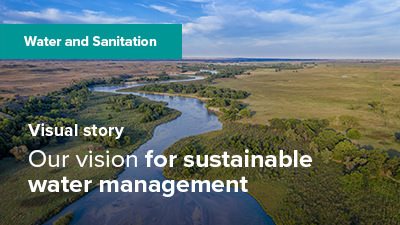The circular economy can bring vast efficiencies
- 11.12.2022
- Author:admin
- (0) Comment
- 564
We’re seeing early evidence of an emerging circular economy in the water and wastewater sector. Sally Watson and Judy Anderson imagine where it could lead.
We’ve landed in 2040 and find that water providers have embraced the circular economy, ‘upcycling’ much of their waste to produce commodities that are valuable to other industries and significantly reducing the amount sent to landfill.
Using the by-products of wastewater treatment
-
Advanced anaerobic digestion of wastewater sludge produces energy-rich biogas. Nutrients and nitrogen recovered from wastewater treatment are used by farmers as fertiliser for their crops. Nitrogen, ammonia and other compounds are sold to chemicals and manufacturing companies.
Large amounts of heat energy left over from the advanced anaerobic digestion (AAD) process have been harnessed by other industries, particularly horticulture, and municipal authorities to meet their own heating needs. In cooler climates, complexes of greenhouses, growing vegetables year-round, are a common sight alongside AAD plants, with pipeline networks transferring heat between them. In warmer climates, effluent is disinfected and used for irrigation to promote greener cities.
In water-stressed locations, wastewater treatment is used to supplement other sources of potable water. It has become increasingly common for water to be treated to a non-potable standard for other uses – municipal watering, crop irrigation and industrial cooling, for example.
-
A no-waste approach to construction and decommissioning
The circular economy has taken root in construction and asset management too. Design for manufacture and assembly (DfMA) is used whenever possible to create new assets. It minimises the consumption of materials, all but eliminates construction waste, and enables components to be recovered and reused when assets are retired or need to be reconfigured.
When old water assets are decommissioned, demolition materials are provided to the construction industry. Mechanical equipment is returned to suppliers to be reconditioned or disassembled for recycling.
Commercialising this process has provided the industry with revenue to re-invest in the development of new, greener infrastructure.
Judy Anderson, Mott MacDonald global practice leader for water
Sally Watson, Mott MacDonald digital leader for water
Source :https://www.mottmac.com/about-us/the-circular-economy-can-bring-vast-efficiencies-to-the-water-industry
















































Share Your Comments
Only members can comment, Click here to sign up for free right now